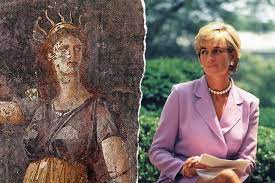
Goddess
A Goddess is defined as "a female deity worshiped like a god, or a woman who is an adored admired or influential person" (Oxford English Dictionary, 1996, as cited in Bramley, 2002). The image of the goddess originated thousands of years ago, in many different forms such as statuettes (Bramley, 2002). In most religions a God-like figure is present, someone for individuals to value and look-up to (Bramley, 2002). Princess Diana embodies all that a goddess could be and more. She used her elite social status to influence positive humanitarian acts (Bramley, 2002). Some of these influential acts consist of her work "with the sick, children, AIDS patients and victims of landmines" (Bramley, 2002). Diana did acts of kindness that others did not believe was possible, which creates "a sense of spiritual feeling that epitomised the essence of the goddess religion" (Bramley, 2002).
Princess Diana may not have all of these qualities but for her following she does channel some throughout her life. Individuals raised diana to a superhuman level, where they worshiped her life and contributions to society. This kind of glorification obligated her to act in such ways that her worshipers expected (Grünhagen). According to Grünhagen, be glorified in this way has relevance "to traditional saints and founder of religion (2010). Princess Diana was infamous for being in the public eye for her struggles, her normal self, as a mother, her divorce with the royals and through her mission work (Grünhagen, 2010). People glorified her because they could relate to her, they had an understanding of her as they thought she had an understanding of them.
Saint
Many believe that a saint is "exclusive to the Catholic Church" (Qualities of saints, 2018). However, other religions and cultures have adapted the idea of a saint, as they have "holy people whom they might or might not call saints" (Qualities of saints, 2018). There are six common saint qualities that religions and cultures may share:
"They are excellent role models,
They are usually good at teaching people to live lives of goodness,
They act as channels of God's Power,
They are intercessors,
They are generous and unselfish,
They are holy and are able to interpret God and holiness for others" (Qualities of saints, 2018).
.

